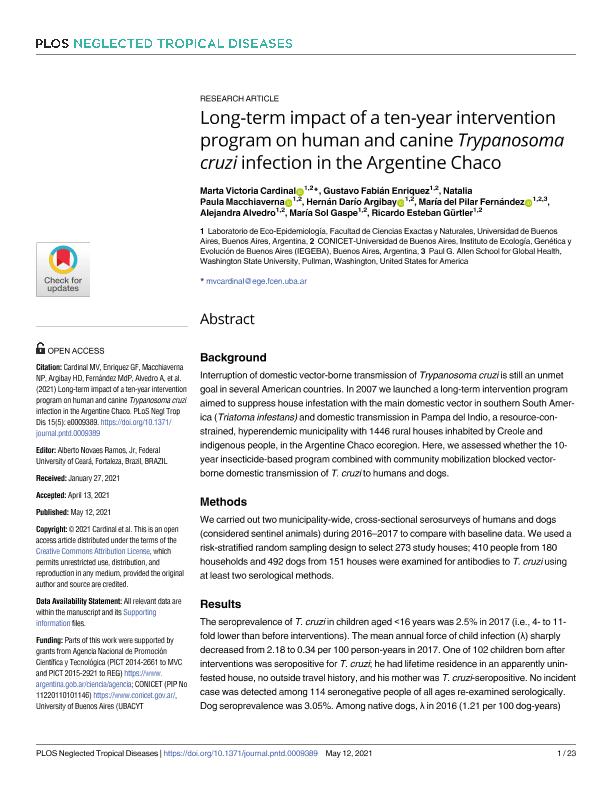Artículo
Long-term impact of a ten-year intervention program on human and canine Trypanosoma cruzi infection in the Argentine Chaco
Cardinal, Marta Victoria ; Enriquez, Gustavo Fabián
; Enriquez, Gustavo Fabián ; Macchiaverna, Natalia Paula
; Macchiaverna, Natalia Paula ; Argibay, Hernán Darío
; Argibay, Hernán Darío ; Fernandez, Maria del Pilar
; Fernandez, Maria del Pilar ; Alvedro, Alejandra
; Alvedro, Alejandra ; Gaspe, Maria Sol
; Gaspe, Maria Sol ; Gurtler, Ricardo Esteban
; Gurtler, Ricardo Esteban
 ; Enriquez, Gustavo Fabián
; Enriquez, Gustavo Fabián ; Macchiaverna, Natalia Paula
; Macchiaverna, Natalia Paula ; Argibay, Hernán Darío
; Argibay, Hernán Darío ; Fernandez, Maria del Pilar
; Fernandez, Maria del Pilar ; Alvedro, Alejandra
; Alvedro, Alejandra ; Gaspe, Maria Sol
; Gaspe, Maria Sol ; Gurtler, Ricardo Esteban
; Gurtler, Ricardo Esteban
Fecha de publicación:
05/2021
Editorial:
Public Library of Science
Revista:
Neglected Tropical Diseases
ISSN:
1935-2735
e-ISSN:
1935-2735
Idioma:
Inglés
Tipo de recurso:
Artículo publicado
Clasificación temática:
Resumen
Background Interruption of domestic vector-borne transmission of Trypanosoma cruzi is still an unmet goal in several American countries. In 2007 we launched a long-term intervention program aimed to suppress house infestation with the main domestic vector in southern South America (Triatoma infestans) and domestic transmission in Pampa del Indio, a resource-constrained, hyperendemic municipality with 1446 rural houses inhabited by Creole and indigenous people, in the Argentine Chaco ecoregion. Here, we assessed whether the 10-year insecticide-based program combined with community mobilization blocked vector-borne domestic transmission of T. cruzi to humans and dogs. Methods We carried out two municipality-wide, cross-sectional serosurveys of humans and dogs (considered sentinel animals) during 2016–2017 to compare with baseline data. We used a risk-stratified random sampling design to select 273 study houses; 410 people from 180 households and 492 dogs from 151 houses were examined for antibodies to T. cruzi using at least two serological methods. Results The seroprevalence of T. cruzi in children aged <16 years was 2.5% in 2017 (i.e., 4- to 11-fold lower than before interventions). The mean annual force of child infection (λ) sharply decreased from 2.18 to 0.34 per 100 person-years in 2017. One of 102 children born after interventions was seropositive for T. cruzi; he had lifetime residence in an apparently uninfested house, no outside travel history, and his mother was T. cruzi-seropositive. No incident case was detected among 114 seronegative people of all ages re-examined serologically. Dog seroprevalence was 3.05%. Among native dogs, λ in 2016 (1.21 per 100 dog-years) was 5 times lower than at program onset. Six native adult dogs born after interventions and with stable lifetime residence were T. cruzi-seropositive: three had exposure to T. infestans at their houses and one was an incident case. Conclusions These results support the interruption of vector-borne transmission of T. cruzi to humans in rural Pampa del Indio. Congenital transmission was the most likely source of the only seropositive child born after interventions. Residual transmission to dogs was likely related to transient infestations and other transmission routes. Sustained vector control supplemented with human chemotherapy can lead to a substantial reduction of Chagas disease transmission in the Argentine Chaco.
Palabras clave:
TRYPANOSOMA CRUZI
,
HUMAN
,
CANINE
,
CHACO
Archivos asociados
Licencia
Identificadores
Colecciones
Articulos(IEGEBA)
Articulos de INSTITUTO DE ECOLOGIA, GENETICA Y EVOLUCION DE BS. AS
Articulos de INSTITUTO DE ECOLOGIA, GENETICA Y EVOLUCION DE BS. AS
Citación
Cardinal, Marta Victoria; Enriquez, Gustavo Fabián; Macchiaverna, Natalia Paula; Argibay, Hernán Darío; Fernandez, Maria del Pilar; et al.; Long-term impact of a ten-year intervention program on human and canine Trypanosoma cruzi infection in the Argentine Chaco; Public Library of Science; Neglected Tropical Diseases; 15; 5; 5-2021; 1-21
Compartir
Altmétricas



